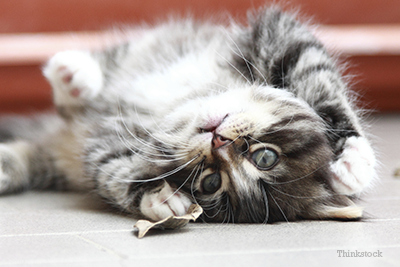Kittens often have parasites that can affect their health and can cause serious problems in humans. Kittens are commonly infected with roundworms, tapeworms as well as protozoan infections such as coccidia.

How will my kitten be tested for intestinal parasites?
Testing your kitten for intestinal parasites involves a laboratory examination of a poop (stool) sample. Many kittens are already using a litter box and the specimen can easily be collected from the litter. Regardless of if the cat poop is taken from the ground or from the litter box, it should be as free of debris as possible. It is important that the sample also be as fresh as possible contain enough volume to conduct the test.
How can I collect a poop sample from my kitten?
When collecting a sample, follow these tips:
- Avoid contaminating your hands
- Use a wooden tongue depressor or plastic knife to pick up the specimen and transfer it to a sealable container
- You can use a small, plastic bag to store the specimen. Seal it using a tie or a zip lock. You can also use a jar, pill vile or a plastic bag.
- Collect the specimen as close to the time of your appointment as possible
- However you collect the specimen, be sure it is fresh, of adequate size and keep it refrigerated or at least in a cool place until your appointment.
What could be found in my cat's poop?
Roundworms
Roundworm infections are spread to kittens from their mother while nursing. Roundworms that are dormant in mother cats are activated by the hormones of pregnancy and the immature larvae enter the kittens during nursing. Since these worms are not yet reproducing, tests of stool samples will be negative early on. It is safest to assume that your kitten has been infected so your veterinarian will administer an oral dewormer several times during the first weeks of life. It is still recommended that you have your kitten’s poop tested for eggs 2-4 times during the first year of her life.
Coccidia
Some intestinal parasites, like coccidia, are very tiny microscopic organisms. Cats become infected with coccidia if they eat the eggs in their environment or if they eat infected, smaller-prey animals. Surveys indicate that up to 36% of cats in North America have coccidial infections and that young animals are more likely to be infected and symptomatic, according to the Companion Animal Parasite Council. Given how common infections are along with the fact that some animals are asymptomatic even when they are shedding, if your kitten is sick and your veterinarian sees coccidia oocysts on a fecal test, they will still have to decide if the coccidia is the cause of the illness or just an incidental finding. If treatment is required, there are many oral medications that your veterinarian can prescribe for your cat.
Tapeworms
It is common for kittens to be infested with fleas. Fleas can be the intermediate host or method of transmission for tapeworms. Tapeworms are difficult to detect on routine laboratory evaluation, but fortunately they are easy to see in and on the stools or around the kitten’s rectum. They resemble a grain of rice.
All of these parasites can impact your kitten and the best way to handle this risk is having your veterinarian deworm the kitten and test her regularly.
If you have any questions or concerns, you should always visit or call your veterinarian -- they are your best resource to ensure the health and well-being of your pets.
